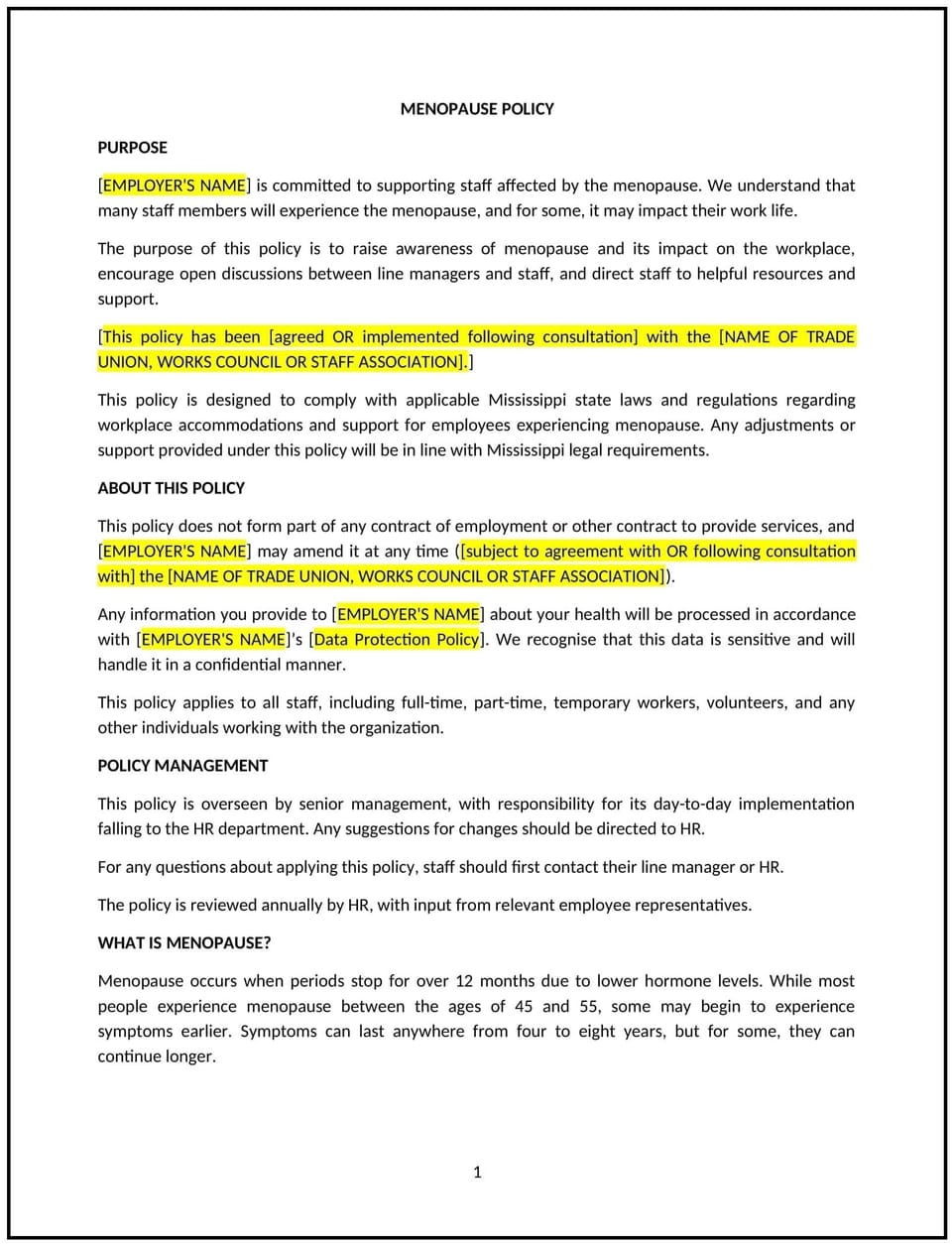Menopause policy (Mississippi): Free template

Menopause policy (Mississippi)
A menopause policy helps Mississippi businesses support employees experiencing menopause-related symptoms, creating an inclusive work environment that accommodates their needs. This policy outlines how businesses can provide assistance and create a workplace culture that promotes understanding and support during menopause. It covers aspects such as flexible working arrangements, access to support, and education for employees and management.
By adopting this policy, businesses can demonstrate their commitment to diversity, inclusivity, and employee well-being, ensuring that employees experiencing menopause are supported in their health and work life.
How to use this menopause policy (Mississippi)
- Create awareness: Educate employees and managers about menopause, its symptoms, and its potential impact on work performance and well-being. This helps to foster a supportive environment where employees feel comfortable discussing their needs.
- Offer flexible working arrangements: Allow employees to request adjustments to their working hours or working environment to accommodate the physical and emotional symptoms associated with menopause, such as temperature sensitivity, fatigue, or mood changes.
- Provide support options: Make resources available, such as counseling services, employee assistance programs (EAPs), and guidance on managing menopause symptoms at work.
- Encourage open communication: Encourage a culture of openness, where employees can approach management with concerns or requests related to their menopause experience without fear of discrimination.
- Set guidelines for reasonable adjustments: Provide guidance on reasonable adjustments that can be made to support employees experiencing menopause, including modifying tasks, offering more frequent breaks, or providing access to cooling or heating equipment.
- Ensure confidentiality: Any personal health information related to menopause should be treated with the utmost confidentiality. Employees should feel confident that their privacy will be respected.
- Train managers: Provide training for managers to recognize menopause symptoms and respond appropriately. Managers should understand how to approach employees with empathy and sensitivity while supporting their needs.
- Review and update the policy: Regularly review the policy to ensure it aligns with any changes in legislation, company goals, or the needs of employees.
Benefits of using this menopause policy (Mississippi)
This policy offers several benefits for Mississippi businesses:
- Promotes inclusivity: By addressing menopause in the workplace, businesses promote inclusivity and equality, ensuring that employees of all genders and stages of life are supported.
- Improves employee well-being: A supportive environment helps employees manage menopause-related symptoms more effectively, reducing stress and improving overall well-being.
- Enhances productivity: Providing accommodations for employees experiencing menopause symptoms can reduce absenteeism and improve productivity by allowing employees to work more comfortably.
- Attracts and retains talent: A workplace that prioritizes inclusivity and employee well-being is more likely to attract and retain a diverse workforce.
- Reduces legal risks: By proactively addressing menopause-related issues, businesses can reduce the risk of discrimination claims and ensure compliance with anti-discrimination laws.
Tips for using this menopause policy (Mississippi)
- Foster a supportive culture: Encourage open dialogue around menopause and other health conditions. This will help create an environment where employees feel comfortable discussing their needs and seeking support.
- Offer regular training: Conduct training sessions for all employees, particularly managers, to educate them about menopause and how they can support colleagues experiencing it.
- Be flexible with accommodations: Consider a range of accommodations to support employees experiencing menopause, including adjustments to hours, tasks, or the physical workspace.
- Monitor and evaluate the policy: Regularly assess the effectiveness of the menopause policy, seeking feedback from employees to identify areas for improvement.
- Provide access to resources: Ensure employees have access to resources, such as health and well-being programs, counseling services, and guidance on managing menopause symptoms.
- Maintain confidentiality: Respect the privacy of employees who disclose menopause-related issues and ensure that their personal information is kept confidential.
Q: Why should Mississippi businesses have a menopause policy?
A: A menopause policy promotes inclusivity, supports employee well-being, and helps businesses manage health-related issues that may impact work performance. It fosters a respectful and supportive work environment for employees experiencing menopause.
Q: What accommodations should be offered to employees experiencing menopause?
A: Businesses should offer flexible working hours, modified tasks, and access to cooling or heating equipment. Reasonable accommodations may vary depending on the employee’s specific symptoms and needs.
Q: Can employees request time off for menopause-related issues?
A: Employees can request time off if their symptoms significantly affect their ability to work. The policy should include provisions for sick leave or other types of leave to support employees during such times.
Q: How should managers support employees experiencing menopause?
A: Managers should provide a supportive, non-judgmental environment where employees feel comfortable discussing their needs. Training on menopause symptoms and appropriate responses is essential for fostering a positive workplace culture.
Q: What if an employee needs to make changes to their working environment due to menopause?
A: The policy should allow for reasonable adjustments, such as providing access to cooler workspaces, flexible schedules, or additional breaks. Businesses should be responsive to individual requests and work with employees to find solutions.
Q: How can businesses maintain confidentiality regarding menopause-related information?
A: Businesses should treat any health-related information with confidentiality, ensuring that only relevant personnel are informed and that the employee’s privacy is respected at all times.
Q: How often should the menopause policy be reviewed?
A: The policy should be reviewed periodically, ideally once a year, to ensure it remains aligned with any changes in legal requirements, company practices, or employee feedback.
Q: Can businesses offer health and wellness resources for employees experiencing menopause?
A: Yes, businesses should offer resources such as employee assistance programs (EAPs), wellness initiatives, or access to counseling services that can help employees manage menopause-related symptoms.
This article contains general legal information and does not contain legal advice. Cobrief is not a law firm or a substitute for an attorney or law firm. The law is complex and changes often. For legal advice, please ask a lawyer.


